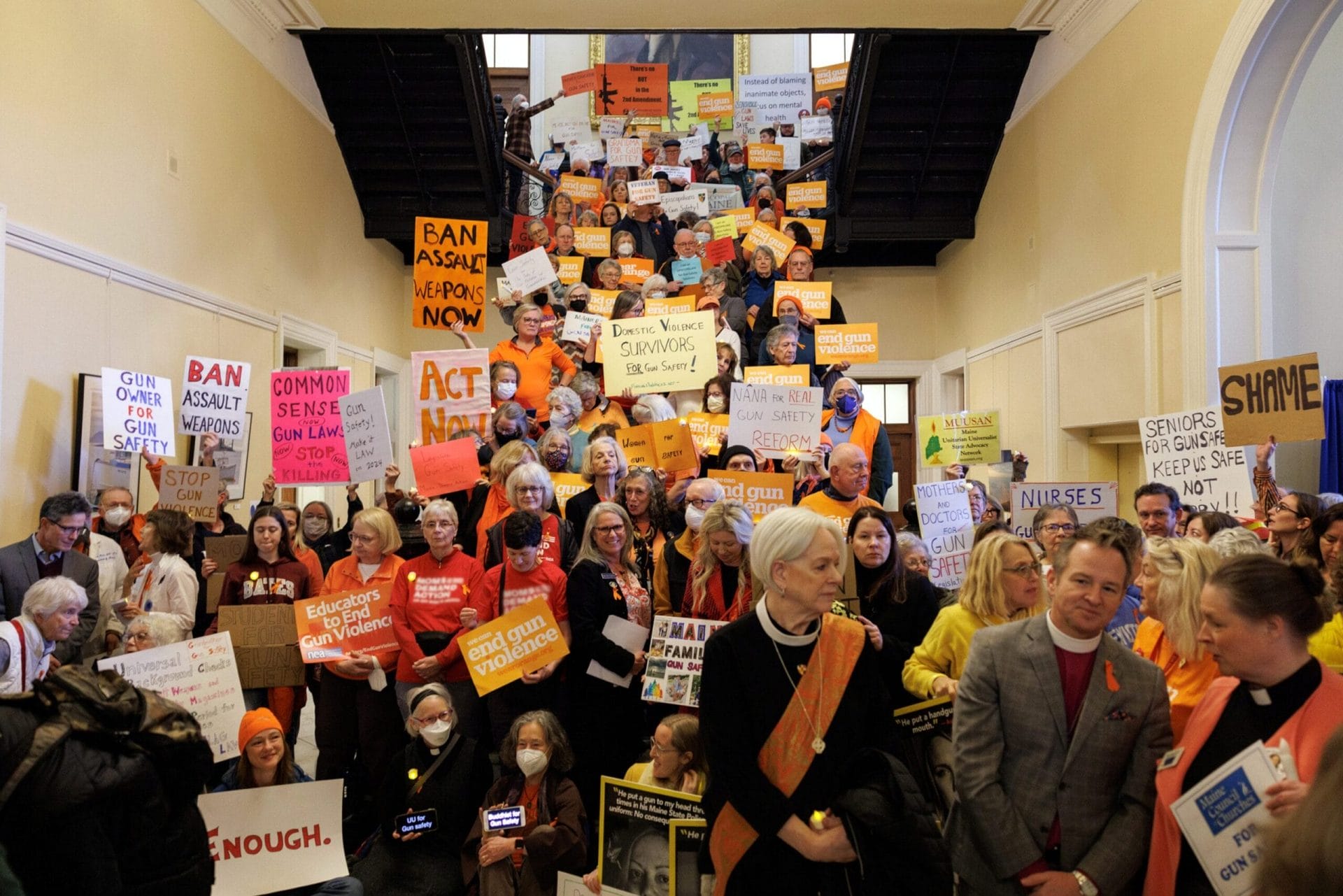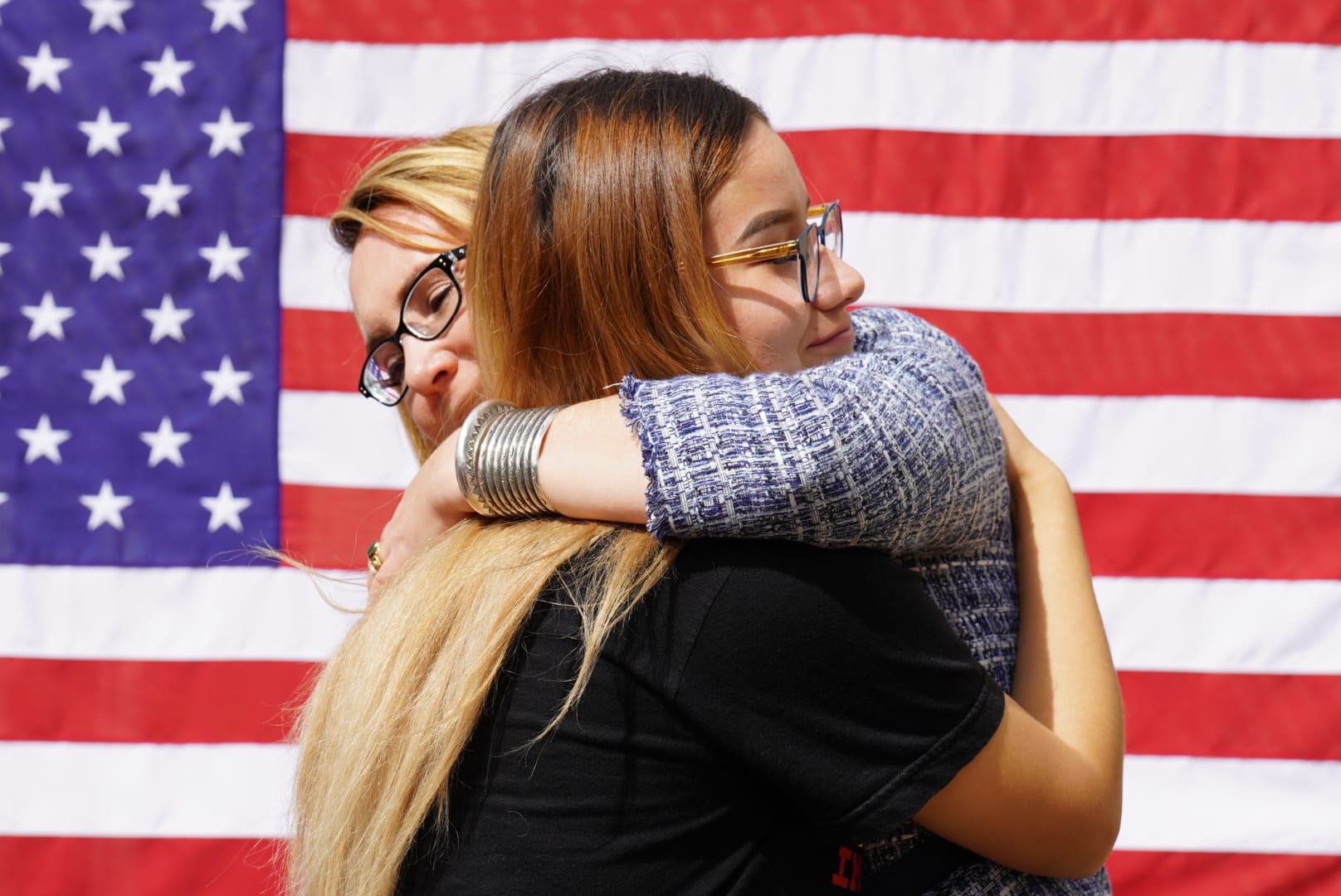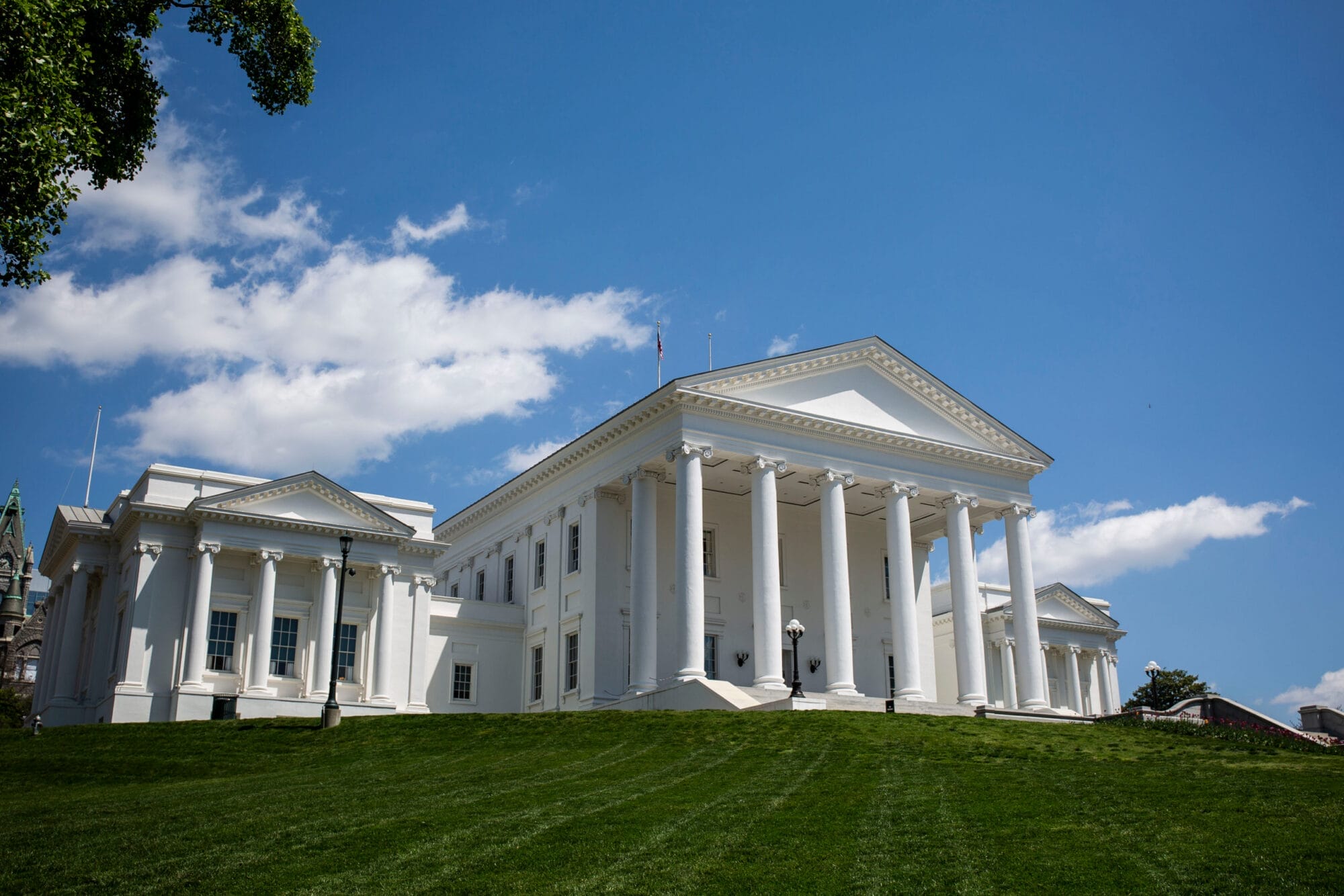
Giffords Law Center Gun Law Trendwatch: 2024 Year-End Review
State Legislatures Made Progress on Gun Safety in 2024
We know what causes this country’s gun violence crisis, and we know how to fix it. But the power to do so lies, at least in part, with state lawmakers. Fortunately, many are stepping up and fighting for strong gun safety laws to protect their communities.
There was a wide range of popular gun policies that states passed this year. Funding for community violence intervention programs continues to rise, as more and more states—both red and blue—invest in this evidence-based work. Laws to hold the gun industry accountable for its dangerous practices and to protect democratic spaces from armed intimidation were also checked off many states’ to-do lists.
Unfortunately, we saw a disturbing trend continue to spread as well: Louisiana and South Carolina became the latest states to pass permitless carry bills. These dangerous laws, falsely dubbed by the gun lobby as “constitutional carry” laws, allow people who have never passed a background check or fired a gun in their lives to carry hidden, loaded guns in public. In the last nine years, an astounding 23 states have adopted permitless carry laws.
But while some state legislators remain in the pocket of the gun lobby, others are responding to tragedy with action—even when their states have a history of being resistant to gun safety laws. Last fall, a mass shooting that left 18 dead and 13 injured rocked the community of Lewiston, Maine. Residents immediately demanded change, and their representatives listened and fought hard to pass new gun safety laws, including instituting a waiting period to buy a gun and expanding background checks. In fact, the progress was so significant that Maine’s grade leapt from a D- to a C+ on GIFFORDS Law Center’s Annual Gun Law Scorecard.
Despite a busy election year, state lawmakers refused to relent in their efforts to enact proven solutions to gun violence. And the year’s not over yet—all eyes are on Michigan as state legislators continue to fight for gun safety legislation.
We’re just a few short weeks from 2025 state legislative sessions kicking off, providing lawmakers with a fresh opportunity to take meaningful action to save lives. Our elected leaders may come and go, but our commitment to ending America’s gun violence crisis will never waver—and we’ll be back shaping policy in statehouses come January.
In 2024, 28 states passed 88 strong bills, bringing the total number of significant gun safety laws passed since the massacre at Sandy Hook Elementary School in 2012 to over 700.
Background Checks & Licensing
Delaware enacted a handgun permit to purchase law (SB 2). Massachusetts strengthened its firearms licensing laws (HB 4885). Maine expanded background check requirements (SB 953). Tennessee enacted a law to ensure that appropriate juvenile records are available for background checks (HB 1600). North Carolina (SB 303) and Washington (SB 6246) enacted laws to help ensure its records are accessible for firearm purchaser background checks, and Connecticut enacted a law to ensure its relevant juvenile records are available nationwide (HB 5467). Colorado enacted a law establishing minimum standards for concealed carry training (HB 1174).
Child Access Prevention & Safe Storage
California (SB 53) and Rhode Island(SB 2202) enacted safe storage laws preventing children and other unauthorized people from gaining unsupervised access to firearms. Connecticut enacted a law that requires the development and distribution of educational material concerning gun safety practices to be provided by primary care providers to patients (SB 1). New York enacted a law to increase awareness among gun owners about the need for safe firearm storage and child access prevention (SB 9760). Colorado (HB 1348) and Delaware (HB 155) also enacted bills to require guns left in unoccupied vehicles be stored safely to prevent theft or other unauthorized access.
Community Violence Intervention & Offices of Violence Prevention
Colorado voters passed Proposition KK, a ballot measure that will impose an excise tax on the profits sellers receive from retail sales of firearms, firearm precursor parts, or ammunition. The measure was referred to the ballot earlier this year by the state legislature (HB 1349). Although this tax will not directly fund community violence intervention programs, it will fund crime victims services and behavioral and mental health care. It follows the success of California’s enactment of AB 28 last year, which pioneered this approach to funding important gun safety work.
Colorado (HB 1430), Delaware (SB 325), Florida (HB 5001), Illinois (SB 251), Maryland (SB 360), Massachusetts (HB 4800), Minnesota (SB 5289), Nebraska (LB 1412), New Jersey (AB 4700 and AB 5326), New York (AB 8804), Pennsylvania (HB 2310), South Carolina (HB 5100), Vermont (HB 839), Virginia (HB 626), and Washington (SB 5950) all passed funding for community violence intervention (CVI) programs. These programs will help individuals at risk of becoming victims of or committing an act of gun violence through a public health and community-oriented approach.
Louisiana enacted a law acknowledging violence as a public safety and health crisis and requiring a review of violence prevention factors, activities, and strategies (SB 509). Maine created an Office of Violence Prevention (HB 1420). Maryland enacted a law creating a Center for Firearm Violence Prevention and Intervention (HB 583), and California codified its Office of Gun Violence Prevention (AB 1252).
Gun Trafficking
Minnesota addressed straw purchasing, the process of one individual purchasing a firearm for another who may be prohibited from purchasing and possessing one (HB 5247). Colorado enacted a law to support law enforcement efforts to fight gun trafficking (SB 3). Washington enacted a law requiring the reporting of lost and stolen firearms, a key provision aimed at gun trafficking (HB 1903).
Hardware
Massachusetts strengthened its assault weapons law (HB 4885). Maryland (HB 810), Massachusetts (HB 4885), Mississippi (HB 903), and Virginia (SB 210) enacted bans on machine gun conversion devices, including auto sears, also known as “Glock switches.” New York also enacted a law to hold gun manufacturers accountable for designing pistols to be easily converted to fire automatically (SB 7365). Massachusetts (HB 4885) and Vermont (SB 209) banned ghost guns.
High-Risk Individuals
California enacted a suite of laws to protect against the dangers of armed domestic abusers (SB 899, AB 1974, AB 2759, AB 2822, and AB 2096). Colorado also strengthened protections against armed domestic abusers (HB 1122).
California enacted two bills to strengthen its law regarding extreme risk protection orders (known as “gun violence restraining orders” in the state). AB 2917 broadened relevant risk factors to include threats against groups protected under the state’s hate crime laws and AB 2621 strengthened law enforcement training regarding these orders. California also enacted laws reducing access to guns for violent abusers of animals (SB 902), and ensuring the relinquishment of firearms by people committed to a mental health facility (SB 1002). Additionally, the state preserved critical funding for firearm relinquishment programs and violence prevention research (AB 107, AB 108, and AB 157).
New York strengthened its extreme risk protection order law by allowing law enforcement agencies to seek these orders directly (AB 7717) and by ensuring that these orders are entered into a statewide database (SB 3340). Massachusetts expanded its extreme risk protective order law to apply to individuals who don’t yet possess a firearm (HB 4885), and to allow healthcare providers to seek these orders. Michigan appropriated funding for the implementation of its extreme risk law (SB 747).
Minnesota created a Task Force on Domestic Violence and Firearm Surrender in a bill that also provided funding for violence prevention research (HB 5216). Delaware created a Voluntary Firearms Do-Not-Sell Registry in which an applicant may voluntarily enroll for the purpose of being prohibited from obtaining a firearm (HB 342).
Industry Regulations
Maryland enacted a gun industry accountability law, opening the courtroom doors so the state can hold bad industry actors accountable and seek justice through the courts (HB 947). New York strengthened its gun industry accountability law (AB 7555). Massachusetts enacted a law to require that gun dealers are inspected regularly and accurately (HB 4885). Colorado enacted a strong law requiring gun dealers to obtain a state license and setting a standard of conduct for those selling firearms (HB 1353). Washington also strengthened its requirements for licensed gun dealers (HB 2118). California strengthened its reporting and transparency requirements related to gun dealer inspections (SB 965).
Protecting Democracy
Colorado (SB 131), Massachusetts (HB 4885), Michigan (HB 4127 and 4128), New Mexico (SB 5), and Vermont (SB 209) passed new laws to limit guns at polling places. These new laws all address the relationship between guns and democracy by passing concealed or open carry restrictions at polling places, lowering the risk of voter intimidation at the polls.The new laws in Colorado and Massachusetts also limit guns in government buildings.
In addition, California enacted the PEACE Act, a groundbreaking bill to protect voters from the threat of intimidation, including armed intimidation (AB 2642). Maine enacted a law to prevent unauthorized paramilitary training (HB 1354).
Sensitive Locations
Colorado designated sensitive places including child care centers and college campuses, as off-limits to guns (SB 131). Washington enacted a law designating libraries, zoos, aquariums, and transit facilities as off-limits to guns (HB 5444). Delaware also designated college and university campuses as off-limits to guns (HB 311).
Pairs of States Make Progress
Pairs of states saw success addressing the following policies this year:
- Waiting Periods: Maine created a 72-hour waiting period before gun purchases (SB 958), and New Mexico instituted a seven-day waiting period (HB 129). Both new laws provide a cool-off period before a gun buyer obtains the firearm.
- Suicide Prevention: Oregon established its new Task Force on Community Safety and Firearm Suicide Prevention (SB 1503), while New York provided for warnings at gun dealers and when licenses are issued about the dangers of firearm ownership, particularly the risk of suicide (SB 6649).
- Merchant Category Codes: New York enacted a law requiring issuers of credit and debit cards to use certain merchant category codes for firearm and ammunition dealers (SB 8479). Colorado enacted a similar law (SB 66).
- Victim Compensation: Connecticut (SB 426) and Maryland (HB 575) enacted laws expanding a victim’s access to compensation.
- Destruction of Crime Guns: California enacted a pair of bills regarding the destruction of crime guns by law enforcement (AB 2842 and SB 1019). Washington enacted a similar law (HB 2021).
- Ammunition Regulation: Hawaii enacted a bill raising the minimum age for ammunition purchases to 21 (SB 2845). Delaware imposed commonsense requirements to prevent the loss or theft of ammunition from vendors (HB 270).
JOIN THE FIGHT
Gun violence costs our nation 40,000 lives each year. We can’t sit back as politicians fail to act tragedy after tragedy. Giffords Law Center brings the fight to save lives to communities, statehouses, and courts across the country—will you stand with us?

Corporate Action
Louisiana (SB 234) and Tennessee (HB 2100) enacted laws to punish certain businesses who choose not to do business with the firearms industry. Florida made a preexisting law of this kind even more damaging (HB 989). Alabama (SB 281), Georgia (HB 1018), Indiana (HB 1084), Iowa (HB 2464), Kentucky (HB 357), Louisiana (SB 301), New Hampshire (HB 1186), Tennessee (SB 2223), Utah (HB 406), and Wyoming (SB 105) enacted laws that prohibit credit card companies or related entities from using a merchant category code or similar feature to identify firearm businesses or deny credit for the purchase of firearms or firearm-related products.
Guns in Parking Lots
New Hampshire enacted a law prohibiting employers from preventing employees from keeping a firearm in a vehicle at their place of business (HB 1336). Idaho worsened its existing law on this subject, expanding an employer’s immunity from liability for allowing an employee to carry firearms in a vehicle on the business premises (SB 1275).
Guns in Schools
Iowa (HB 2586), Nebraska (LB 1329), South Dakota (SB 203), Tennessee (SB 1325), and Utah (HB 84 and HB 119) loosened their laws to allow teachers or other non-law enforcement officers to carry firearms in schools.
Indiana passed HB 1235, which provides that only the state, and not local governments, may sue firearm sellers and trade associations concerning the design, advertising, sale, or use of a firearm, ammunition, or component part. Idaho (SB 1374), Iowa (HB 2556), Louisiana (SB 194), Tennessee (SB 2763), West Virginia (HB 4782), and Wyoming (SB 109) broadened their laws depriving local governments of the ability to enact and enforce strong gun safety ordinances. Wyoming’s law also prevents state law enforcement officers from assisting other states in the enforcement of those states’ extreme risk laws.
Permitless Carry
Louisiana (SB 1) and South Carolina (HB 3594) enacted permitless carry laws, removing the requirement that a person have a permit to carry a concealed weapon in public in those states.
Other Dangerous Laws
Oklahoma enacted a law to allow concealed carry permits to be renewed online (SB 1291). South Dakota now prohibits a homeowners association from placing restrictions on firearms or firearm ammunition (SB 39).
Our experts helped successfully defend Florida’s minimum age and background check laws against gun lobby efforts to repeal them.
Arizona’s governor vetoed a bill that would have expanded that state’s dangerous Stand Your Ground law and given property owners broad immunity for shooting migrants on their land (HB 2843).
Wisconsin’s governor vetoed a bill that would have prohibited credit card companies or related entities from using a merchant category code or similar feature to identify firearm businesses (SB 466).
A North Carolina permitless carry bill that was introduced in 2023 failed to move in 2024 (HB 189), despite pressure from the gun lobby. The gun lobby’s efforts to arm teachers through legislation failed in Alaska and Idaho (HB 415), among other states.
SUPPORT GUN SAFETY
We’re in this together. To build a safer America—one where children and parents in every neighborhood can learn, play, work, and worship without fear of gun violence—we need you standing beside us in this fight.




